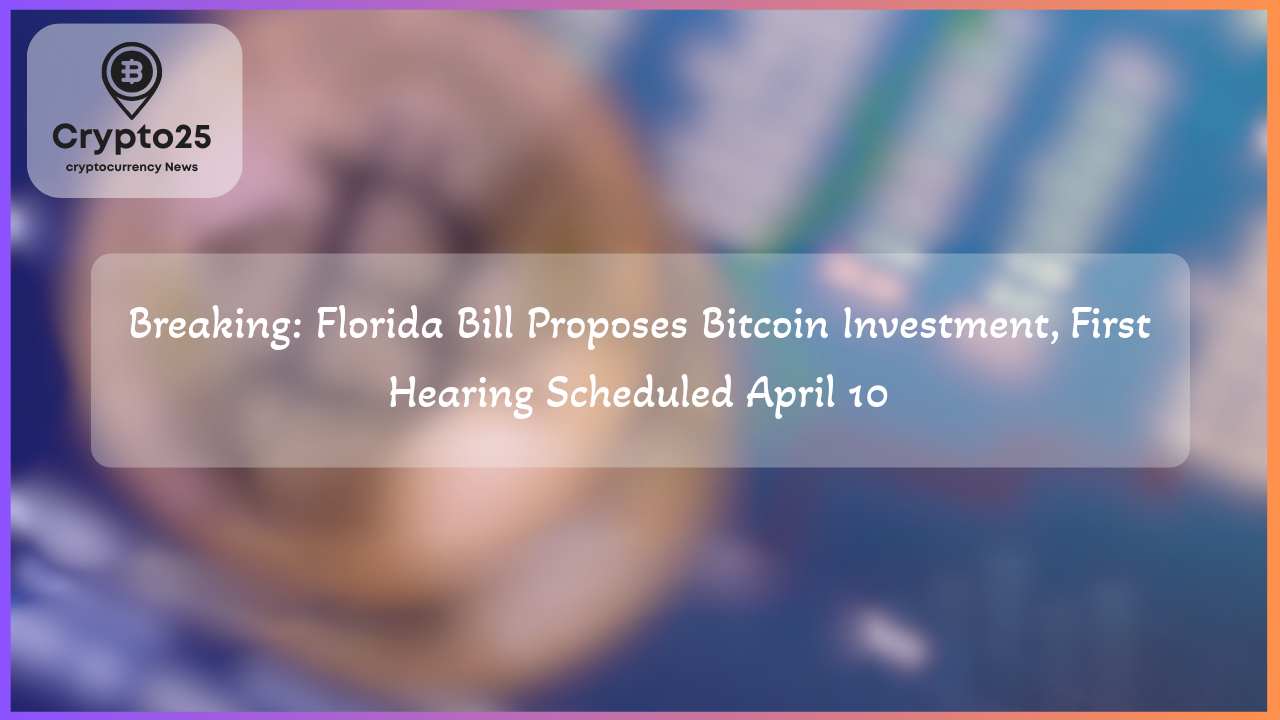
Florida is embarking on a significant step into the crypto space with a proposed bill that could revolutionize the state’s approach to Bitcoin investments. House Bill 487, set for discussions on April 10 in the Insurance & Banking Subcommittee, aims to authorize Florida’s Chief Financial Officer (CFO) to allocate public funds into Bitcoin, marking a turning point in how U.S. states engage with cryptocurrency.
### Florida’s Bitcoin Reserve Bill: A Bold Step Toward Crypto Adoption
House Bill 487, popularly dubbed the “Bitcoin Reserve Bill,” has captured widespread attention as Florida seeks to embrace Bitcoin in an unprecedented manner. The bill proposes allowing the state CFO to invest up to 10% of public funds in Bitcoin, potentially opening doors to new possibilities for cryptocurrencies within government operations. In addition to the investments, the bill outlines comprehensive guidelines for Bitcoin custody, lending, and taxation.
Provisions within the proposed legislation emphasize proper asset management by granting designated financial administrators the ability to lend Bitcoin held in state funds. Taxes and fees collected in Bitcoin would be converted to U.S. dollars to ensure compatibility with existing fiscal systems. Notably, a portion of these converted funds would flow into Florida’s General Revenue Fund, ensuring a seamless integration of Bitcoin transactions into regular governmental processes. These measures indicate a cautious yet forward-thinking approach to cryptocurrency adoption.
Beyond investments, the legislation grants the Trustees of the State Board of Administration the authority to invest System Trust Fund assets into Bitcoin. This provision exempts such investments from certain state security regulations, signaling Florida’s intention to provide financial administrators with greater flexibility to navigate the evolving crypto landscape.
| Title | Details |
|---|---|
| Market Cap | $1.2 Trillion |
### National Trends in U.S. Bitcoin Reserve Legislation
Florida’s move to consider Bitcoin reserves places it among a growing list of states exploring similar initiatives. Across the nation, momentum is building as legislators explore the merits of investing public funds in cryptocurrency. States like Utah, for instance, have already made strides in this area. Utah’s Bitcoin Reserve Bill recently passed the House Economic Development Committee and now awaits Senate deliberation. Other states, including Missouri, Arizona, Oklahoma, and Kentucky, are also advancing efforts to establish Bitcoin reserves, showcasing an expanding interest in integrating digital assets into public funds.
So far, Kentucky has distinguished itself as a leader in Bitcoin legislation by becoming the 16th state to propose crypto-focused reserve laws. Joining peers like Texas, Wyoming, and Massachusetts, it reflects a broader trend across the U.S. where both traditionally conservative and progressive states are uniting to explore the strategic role Bitcoin can play in modern governance.
Florida’s HB 487 distinguishes itself as the first bill of its kind to be put forward for a public hearing. Observers nationwide will watch closely as the state makes its case for greater crypto involvement. With Florida already a hub for fintech innovation, House Bill 487 strengthens its position as a pioneer in leveraging blockchain technology for public financial goals.
### What Could Bitcoin Reserves Mean for Florida’s Future?
The implications of Bitcoin-backed reserves are immense, ranging from diversifying state financial mechanisms to embracing the potential of blockchain innovation. For instance, such reserves could potentially protect governmental funds from inflationary risks associated with fiat currencies. Additionally, Bitcoin’s decentralized nature could provide a layer of financial resilience amid global economic disruptions.
However, challenges remain. Critics of the initiative have raised concerns over Bitcoin’s price volatility and potential risks involved in allocating public funds to an emerging asset class. To mitigate these concerns, Florida’s bill includes safeguards such as structuring Bitcoin investments within existing fiscal frameworks.
Should the bill pass, Florida will likely serve as a model for other U.S. states and even international jurisdictions considering similar initiatives. As an early adopter, the Sunshine State could play a significant role in shaping global crypto policy through practical experimentation.
### A Transformative Step in Crypto History
House Bill 487 underscores Florida’s readiness to step into the future of finance by integrating Bitcoin into its public funds management. As states continue refining their positions on cryptocurrency adoption, Florida’s bold approach could pave the way for a wider acceptance of Bitcoin across governmental entities. Whether it’s building economic resilience or embracing blockchain technology, the passage of this bill may mark a defining moment in the evolution of crypto legislation in America.
With lawmakers and crypto enthusiasts alike paying close attention, Florida may soon lead the charge in transforming the way governments interact with decentralized financial systems. The developments surrounding HB 487 could signal the dawn of a new era in state-backed crypto adoption.
